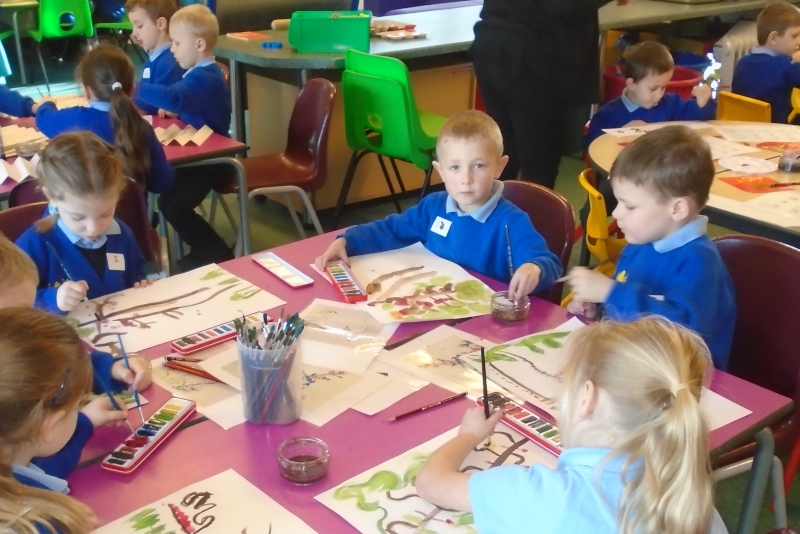Mathematics

Maths Rationale
At Mrs Bland’s Infant and Nursery School our aim is to ensure that all children have the best grounding in mathematics. Through mathematics, we actively aim to provide a relevant, challenging and enjoyable curriculum for all children. Children develop the use of mathematical language through speaking and listening, including reasoning and explanations. Our teaching will enable all children to understand the value of mathematics in everyday situations. Every child at Mrs Bland’s is a mathematician.
Curriculum Intent
At Mrs Bland’s Infant and Nursery School it is our intent to provide children with a high-quality, broad and challenging mathematics curriculum. The exciting learning journey will allow for all children to become fluent in the fundamentals of maths, developing their conceptual understanding and the ability to recall and apply knowledge rapidly and accurately.
Children will be able to reason mathematically by justifying, making links to known facts, or providing proof using mathematical language. Understanding of concepts will be challenged through solving problems and applying their mathematic knowledge. We will equip children with the foundations of mathematics that are essential to everyday life and ensure that they are equipped for their lives beyond school.
Curriculum Implementation
At Mrs Bland’s, our curriculum has been developed to be inclusive of all learners; lessons are planned and delivered in order to allow children to reach their full potential.
In the Early Years, our young mathematicians will be provided with many exciting opportunities, through planned purposeful play and a mix of adult-led and child-initiated activities, to develop and improve their skills in counting, understanding and using numbers, calculating simple addition and subtraction problems; and to describe shapes, spaces, and measure.
Throughout Key Stage 1, we follow the White Rose Mathematics Scheme of Learning and supplement this with resources from NCETM Mastery Documents to teach a broad and challenging curriculum. We are working hard to move towards a mastery-based approach; encouraging a deepened understanding of the concepts taught. Our teaching follows a CPA (concrete, pictorial, abstract) approach to ensure all learners can access the learning.
Our mathematics curriculum will provide many opportunities for children to develop confidence and fluency with whole numbers, counting and place value. The use of practical equipment, such as concrete objects and measuring tools, will support the children to gain a deeper conceptual understanding before being challenged through tasks and questions to explain their reasoning and solve a range of problems. The children are equipped with the skills to recognise shapes and their properties and measures to describe and compare different quantities such as length, mass, capacity/volume, time and money.
Curriculum Impact
Children at Mrs Bland’s speak about maths with confidence and enthusiasm. They are able to make links within their learning and to the real world and show an understanding of why we learn things. The children are increasingly confident with reasoning and explaining mathematical concepts. This is evident within their lessons and in the work completed. Children are able to use key vocabulary when speaking about their learning and are beginning to use full sentences when answering questions during lessons.
The children are independent in their use of resources to support their learning. They are able to use basic skills in order to approach more challenging concepts and can apply prior knowledge to new concepts. Staff plan lessons that allow children to practise fluency, problem solving and reasoning at all levels.
You can view the long term plans for Mathematics by:
Clicking here for the curriculum overview for Nursery
Clicking here for the curriculum overview for EYFS (Yr R)
Clicking here for the curriculum overview for Yr 1
Clicking here for the curriculum overview for Yr 2
Assessment and Monitoring
A variety of methods are used to find out what the children know and understand. Lesson activities are scaffolded to suit the different abilities of the children. Mathematics lessons allow for collaborative learning and thus encourage children to talk in pairs, small groups or through class discussion, to share learning. For those children who grasp concepts rapidly, they will be challenged through a range of problems, whilst those not sufficiently fluent will be provided with opportunities to consolidate their understanding through additional practice and first response intervention. Children’s understanding of taught concepts will be assessed using end of block assessments which provide opportunities for children to demonstrate their understanding fully. Evidence of the children’s learning journey through each Mathematics topic will be recorded in Maths books and individual document wallets.
We have developed termly assessment sheets, with statements taken directly from the National Curriculum Programmes of Study. As each unit of work is covered, we consider the related intended learning, recognise children who are working at or beyond the expected level for Key Stage 1, as well as identifying the children who need and who will therefore receive support. Children in the Foundation Stage will be assessed against the Early Years Learning Goal. Children in Year 2 will be assessed against the End of Year 2 Teacher Assessment Framework.
Mathematics monitoring includes work scrutinies, lesson observations and/or learning walks, pupil voice interviews/questionnaires in order to ascertain correct curriculum coverage, the quality of teaching and learning as well as the children’s attitudes to and retention of maths learning. This information is then used to inform further curriculum developments and provision is adapted accordingly.
Calculation Policy
You can view our Calculation Policy by clicking here. (The policy gives an overview of different models and images that may be used to support the teaching of different maths concepts for each of our year groups)

